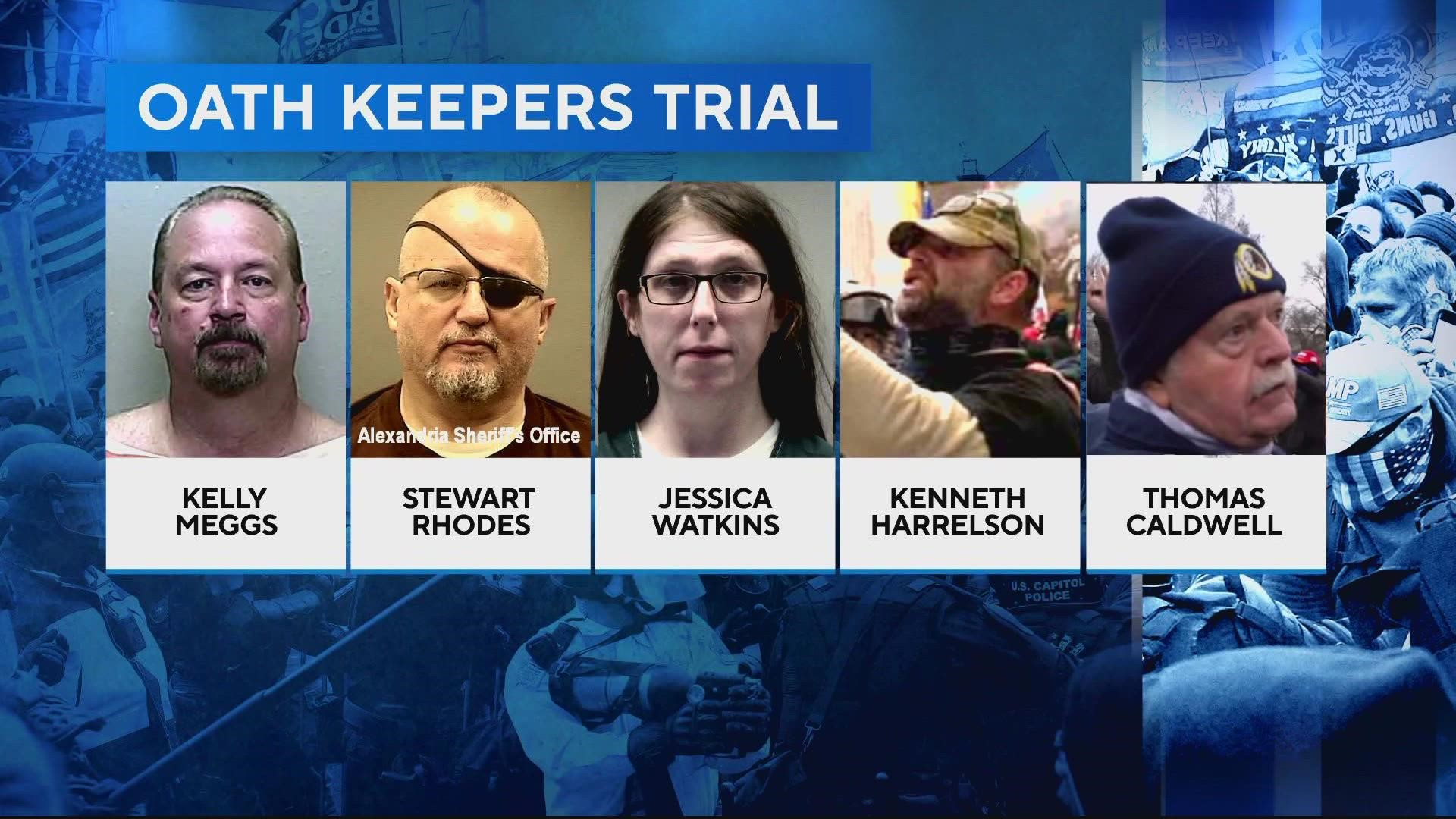WASHINGTON — An Oath Keeper who entered the U.S. Capitol Building with other members of the militia on Jan. 6 testified Monday he saw it as a moment akin to the storming of the Bastille during the French Revolution.
Graydon Young, 55, of Englewood, Florida, took the stand Monday afternoon in the seditious conspiracy trial of Oath Keepers leader Stewart Rhodes and four co-defendants. Young was one of 16 Oath Keepers indicted last year in connection with the Capitol riot and was the first those defendants to accept a plea deal – to charges of conspiracy and obstruction of an official proceeding – in exchange for his cooperation.
Young said he was an 11-year veteran of the U.S. Navy Reserves who became disaffected after former President Donald Trump lost the 2020 election. He began spending up to six hours a day on YouTube and Facebook looking at content claiming the election had been stolen. Like another Oath Keeper who testified earlier in the trial, Jason Dolan, Young said he eventually found a like-minded community of people who didn’t accept the results of the election in the Oath Keepers, who he was introduced to by his sister, Laura Steele. Steele, a former police officer in North Carolina, was also indicted in the sprawling Oath Keepers case and is currently awaiting trial.
Although he said the Signal chat group for the Oath Keepers Florida chapter was full of discussions about how the election was stolen, Young said by late December his commitment to the group was waning. Then, on Christmas Day, Rhodes sent the channel a message.
“[Trump] needs to know that if he fails to act, then we will,” Rhodes wrote. “He needs to understand that we will have no choice.”
Young said that “re-galvanized” him and directly led to his decision to join the Oath Keepers in D.C. on Jan. 6. Once there, he participated in a security detail and, ultimately, was part of approximately a dozen Oath Keepers who entered the U.S. Capitol Building as part of what the government has called “Stack 1.” Three other members of Stack 1 – Jessica Watkins, of Ohio, and Kelly Meggs and Kenneth Harrelson, both of Florida – were among the five defendants in court Monday facing seditious conspiracy charges.
Young testified about what he described as the militia’s “self-evident” plan to prevent the peaceful transfer of power, and also about a response he received from Meggs, who was the Oath Keepers’ Florida state leader, when he attempted to introduce him to the Proud Boys. Meggs, who bragged in messages previously released in court filings about forming an alliance with the Proud Boys, told Young he already had high-level contacts with the group.
“When real s*** starts, Proud Boys die first,” Meggs wrote in a Signal chat. “It’s OK someone has to be first. It’s always the loud mouths with air soft s*** on. I’d rather be the silent killer than the loud mouth dead.”
Young also said it was Meggs who, after speaking on the phone with Rhodes, alerted the Oath Keepers in Stack 1 that the Capitol had been breached, telling them, “We’re in.”
“Unfortunately for me, at the time, I felt like it was a Bastille-type moment,” Young said. “In French history, it was the moment the population made themselves felt. I thought it was going to be a similar moment.”
Young said he realized quickly after the riot that the FBI would be looking for him, and said he pleaded guilty because he felt he needed to “confess completely and wholly.” But he also agreed with defense attorneys that there was never an explicit discussion about storming the Capitol – something they repeatedly hammered on Monday.
“You’ll forgive me, but in listening to you for the last hour and a half, I haven’t heard you articulate actually having an agreement with anyone, did you?” James Lee Bright, an attorney for Stewart Rhodes, asked Young.
“You never sat down with Jessica [Watkins] and said, hey, we’re going to go down there?” asked Jonathan Crisp, Watkins’ attorney.
Defense attorney Brad Geyer, representing Harrelson, suggested Young was “projecting” his own mindset onto his client – but ended his questioning and sat down before Young had a chance to answer.
Although prosecutors have pointed to Rhodes’ and other Oath Keepers’ repeated statements about civil war in numerous forums leading up to Jan. 6 as one element proving the group had a shared mindset, the lack of a witness who’s been able to point to a definitive plan to enter the Capitol on Jan. 6 has remained an open target for the defense. On redirect, assistant U.S. attorney Jeffrey Nestler addressed it directly, asking Young if he felt there was any doubt about why the group was in D.C. that day.
“I feel like it’s common sense,” Young said. “We talked about doing something about the fraud before we went there on Jan. 6. And then when the crowd went over to the building on Jan. 6, it opened up the opportunity to do something.”
Nestler said Monday the government was planning on calling four more witnesses in the case, including one more “civilian witness” expected to be another cooperating Oath Keeper. The defense was expected to take as long as two weeks in presenting their own case, with multiple defendants suggesting they might take the stand to testify.
WUSA9 reporter Jordan Fischer will be in court throughout the trial providing daily coverage. Follow him on Twitter at @JordanOnRecord and subscribe to our weekly newsletter “Capitol Breach” for all the latest Jan. 6 coverage.

